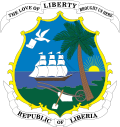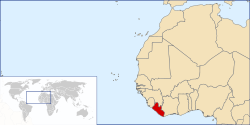Portal:Africa



Africa is the world's second-largest and second-most populous continent after Asia. At about 30.3 million km2 (11.7 million square miles) including adjacent islands, it covers 20% of Earth's land area and 6% of its total surface area. With nearly 1.4 billion people as of 2021, it accounts for about 18% of the world's human population. Africa's population is the youngest among all the continents; the median age in 2012 was 19.7, when the worldwide median age was 30.4. Based on 2024 projections, Africa's population will exceed 3.8 billion people by 2100. Africa is the least wealthy inhabited continent per capita and second-least wealthy by total wealth, ahead of Oceania. Scholars have attributed this to different factors including geography, climate, corruption, colonialism, the Cold War, and neocolonialism. Despite this low concentration of wealth, recent economic expansion and a large and young population make Africa an important economic market in the broader global context, and Africa has a large quantity of natural resources.
Africa is highly biodiverse; it is the continent with the largest number of megafauna species, as it was least affected by the extinction of the Pleistocene megafauna. However, Africa is also heavily affected by a wide range of environmental issues, including desertification, deforestation, water scarcity, and pollution. These entrenched environmental concerns are expected to worsen as climate change impacts Africa. The UN Intergovernmental Panel on Climate Change has identified Africa as the continent most vulnerable to climate change.
The history of Africa is long, complex, and varied, and has often been under-appreciated by the global historical community. In African societies the oral word is revered, and they have generally recorded their history via oral tradition, which has led anthropologists to term them "oral civilisations", contrasted with "literate civilisations" which pride the written word. African culture is rich and diverse both within and between the continent's regions, encompassing art, cuisine, music and dance, religion, and dress.
Africa, particularly Eastern Africa, is widely accepted to be the place of origin of humans and the Hominidae clade, also known as the great apes. The earliest hominids and their ancestors have been dated to around 7 million years ago, and Homo sapiens (modern human) are believed to have originated in Africa 350,000 to 260,000 years ago. In the 4th and 3rd millennia BCE Ancient Egypt, Kerma, Punt, and the Tichitt Tradition emerged in North, East and West Africa, while from 3000 BCE to 500 CE the Bantu expansion swept from modern-day Cameroon through Central, East, and Southern Africa, displacing or absorbing groups such as the Khoisan and Pygmies. Some African empires include Wagadu, Mali, Songhai, Sokoto, Ife, Benin, Asante, the Fatimids, Almoravids, Almohads, Ayyubids, Mamluks, Kongo, Mwene Muji, Luba, Lunda, Kitara, Aksum, Ethiopia, Adal, Ajuran, Kilwa, Sakalava, Imerina, Maravi, Mutapa, Rozvi, Mthwakazi, and Zulu. Despite the predominance of states, many societies were heterarchical and stateless. Slave trades created various diasporas, especially in the Americas. From the late 19th century to early 20th century, driven by the Second Industrial Revolution, most of Africa was rapidly conquered and colonised by European nations, save for Ethiopia and Liberia. European rule had significant impacts on Africa's societies, and colonies were maintained for the purpose of economic exploitation and extraction of natural resources. Most present states emerged from a process of decolonisation following World War II, and established the Organisation of African Unity in 1963, the predecessor to the African Union. The nascent countries decided to keep their colonial borders, with traditional power structures used in governance to varying degrees. (Full article...)
Selected article –
Bokoni (meaning 'land of the people from the north') was a pre-colonial, agro-pastoral society found in northwestern and southern parts of present-day Mpumalanga province, South Africa. Iconic to this area are stone-walled sites, found in a variety of shapes and forms. Bokoni sites also exhibit specialized farming and long-distance trading with other groups in surrounding regions. Bokoni saw occupation in varying forms between approximately 1500 and 1820 A.D. (Full article...)
Featured pictures –
Did you know (auto-generated) -

- ... that Freetown, Alabama, was founded by free and formerly enslaved African Americans in Alabama, whose church, built in 1929, burned down in 2022?
- ... that African porters in Salvador, Bahia, went on strike after the provincial government passed a law requiring them to wear metal identification tags?
- ... that the pulse stops during the soliloquy of In C Mali?
- ... that British communist leader Trevor Carter was the stage manager for the first British-Caribbean carnival, held in St Pancras Town Hall?
- ... that the political and media storm around so-called African gangs in Australia has been described by academics as a moral panic?
- ... that ten years after publishing the book Great South African Christians, Horton Davies gave a speech criticizing South African churches and synagogues for their role in apartheid?
Categories
Selected biography –
John Maxwell Coetzee FRSL OMG (born 9 February 1940) is a South African and Australian novelist, essayist, linguist, translator and recipient of the 2003 Nobel Prize in Literature. He is one of the most critically acclaimed and decorated authors in the English language. He has won the Booker Prize (twice), the CNA Literary Award (thrice), the Jerusalem Prize, the Prix Femina étranger, and The Irish Times International Fiction Prize, and holds a number of other awards and honorary doctorates.
Coetzee moved to Australia in 2002 and became an Australian citizen in 2006. He lives in Adelaide, South Australia. He is patron of the J. M. Coetzee Centre for Creative Practice at the University of Adelaide. His most recently published book is The Pole and Other Stories (2023). (Full article...)
Selected country –
 |
 |
|

| ||
Liberia, officially the Republic of Liberia, is a country on the west coast of Africa, bordered by Sierra Leone, Guinea, and Côte d'Ivoire. Liberia, which means "Land of the Free", was founded as an independent nation, with support of the American government, for free-born and formerly enslaved Blacks and, thus, is one of only two nations in Africa (along with Ethiopia) that didn't fall under European domination. Since 1989, it has witnessed two civil wars, the First Liberian Civil War (1989 – 1996), and the Second Liberian Civil War (1999 – 2003), that have displaced hundreds of thousands of people and destroyed the country's economy.
The population of over 3 million comprises 16 indigenous ethnic groups and various foreign minorities. Indigenous peoples comprise about 95% of the population, the largest of which are the Kpelle in central and western Liberia. Americo-Liberians, who are descendants of freed slaves that arrived after 1821, make up an estimated 5% of the population. As of 2006, Liberia has the highest population growth rate in the world (4.91%). (Read more...)
Selected city –

Francistown is the second-largest city in Botswana, with a population of about 103,417 inhabitants and 147,122 inhabitants in its agglomeration at the 2022 census. It is located in eastern Botswana, about 400 kilometres (250 mi) north-northeast from the capital, Gaborone. Francistown is located at the confluence of the Tati and Ntshe rivers, and near the Shashe River (tributary to the Limpopo) and 90 kilometres (56 mi) from the international border with Zimbabwe.
Francistown was the centre of Southern Africa's first gold rush and is still surrounded by old and abandoned mines. The City of Francistown is an administrative district, separated from North-East District. It is administered by Francistown City Council. The main language spoken and used in and around Francistown is Kalanga. Other languages used in the area are isiNdebele, ChiShona as well as SeTswana. Francistown is the only city in Botswana with an English name. There are no English-language named towns and only a couple of villages with English names. (Full article...)
In the news
- 28 April 2025 – Red Sea crisis
- 68 people are killed and 47 others are injured in a U.S. airstrike on a prison holding African migrants in Saada Governorate, Yemen. (CTV News)
- 28 April 2025 – Somali Civil War
- Several mortars from alleged Al-Shabaab militants strike Aden Adde Airport and Halane Camp, the residences of the UNSOM, AUSSOM, and foreign embassies. (Hiiraan Online)
- 27 April 2025 – Sudanese civil war
- Rapid Support Forces militants kill over 31 civilians, including minors, in a mass shooting near al-Salha, Omdurman. (Sudan Tribune)
- 26 April 2025 – Islamist insurgency in the Sahel
- Twelve soldiers are killed in clashes with militants near the village of Sakoira, Niger. (Reuters)
- 24 April 2025 – Somali Civil War
- Al-Shabaab militants seize the town of Wargaadhi and its military base in Middle Shabelle, Somalia. More than 40 militants and twelve clan fighters are killed in related combat. (Al Jazeera)
- 24 April 2025 – Islamist insurgency in the Sahel
- The Beninese government announces that 54 soldiers were killed in an attack by Jama'at Nasr al-Islam wal Muslimin (JNIM) in the north of the country last week, after previously announcing only eight soldiers were killed. JNIM claims 70 soldiers were killed in the attack. (BBC News)
Updated: 6:05, 29 April 2025
General images -
Africa topics
More did you know –

- ...that the 1459 Fra Mauro map (pictured) reports that "a junk from India" rounded the Cape of Good Hope in 1420, around 70 years before the navigations of Vasco da Gama?
- ...that the 1998 Sudan famine was caused by human rights abuses in the midst of the Second Sudanese Civil War?
- ...that a smokie is a West African delicacy made by blowtorching the carcass of a sheep or goat without removing its fleece?
- ...that Anne-Marie Nzié, a Cameroonian bikutsi singer, dedicated the song Liberté to President Paul Biya and his party, the Cameroon People's Democratic Movement?
Related portals
Major Religions in Africa
North Africa
West Africa
Central Africa
East Africa
Southern Africa
Associated Wikimedia
The following Wikimedia Foundation sister projects provide more on this subject:
-
Commons
Free media repository -
Wikibooks
Free textbooks and manuals -
Wikidata
Free knowledge base -
Wikinews
Free-content news -
Wikiquote
Collection of quotations -
Wikisource
Free-content library -
Wikispecies
Directory of species -
Wikiversity
Free learning tools -
Wikivoyage
Free travel guide -
Wiktionary
Dictionary and thesaurus


























































































